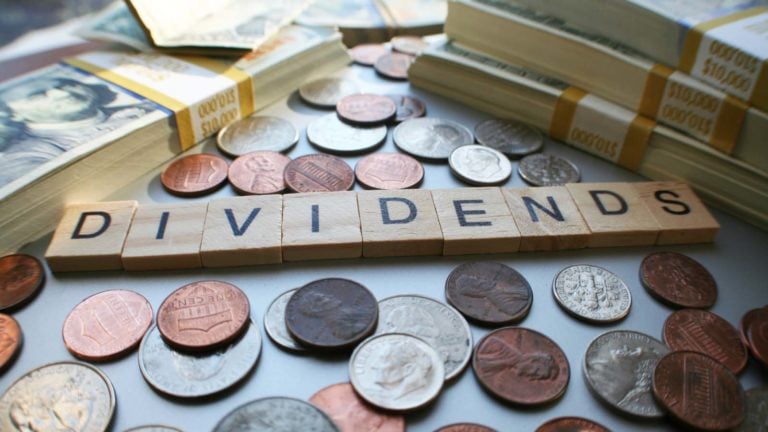Dividend stocks have proved time and again to be a superior investing strategy. We all want capital appreciation, or to see our stocks grow in value over time, but dividends are what really drive excess returns.
Analysts at JPMorgan Chase (NYSE:JPM) studied the long-term impact dividends have on stocks. They found dividends accounted for an astounding 89% of the stock market’s total return over the 40-year period between 1972 and 2012. We all heard that the S&P 500 generates on average a 10% annual return over time. Well, almost nine percentage points of that comes from dividends!
Also, no matter what market conditions are like, dividend stocks outperform those that don’t make a payout. There is no decade where dividend stocks did not generate positive returns. The market, as a whole, can’t say that.
The reason is simple. Companies that pay dividends are typically healthier than those that don’t. They have been fire-tested by the market and still thrive. Dividends also help buffer the impact of market downturns, contributing to lower volatility. That’s why dividend stocks need to be an essential part of your portfolio.
JPMorgan’s study also discovered that companies that initiated and then hiked their dividends returned an average of 9.5% annually while non-income producing stocks generated only 1.6% annually. Arguably, that makes Dividend Kings the best ones to buy. These are stocks that raise their payout each and every year for 50 years or more.
The following three Dividend Kings are ones you should buy now if you want to survive and thrive following a stock market crash.
Walmart (WMT)

In the event of an economic downturn, you’re going to want Walmart (NYSE:WMT) in your portfolio. It is the world’s largest supermarket and general merchandise retailer with over 11,500 stores across 27 countries.
There is a Walmart store within 10 miles of 90% of the U.S. population. Not only does that make it incredibly convenient to most consumers, but in times of distress its everyday low price policies make it the place most will turn to as they stretch their wallets to make ends meet.
Its dividend is every bit a staple as is its food. Walmart first declared a dividend in March 1974 and has increased every year thereafter. It was 5 cents per share back then. Today it stands at $2.33 per share and yields 1.5% annually. That’s a growth rate of 8% a year for 50 straight years.
What makes Walmart so formidable is the scale of its operations. It is able to squeeze suppliers to ensure it gets the best price for customers. And where other retailers stumbled in competing against Amazon (NASDAQ:AMZN), Walmart rose to the challenge and represents a viable alternative to the e-commerce leader.
It remains consistently profitable, even during recessions. In fact, recessions may be its forte. The stock generated total returns of 5,000% over the past five decades – or double those of the S&P 500.
Colgate-Palmolive (CL)

What Walmart does for groceries, Colgate-Palmolive (NYSE:CL) does for consumer products. Best known for its namesake toothpaste and dish detergent, Colgate has a global portfolio of name brand products including Irish Spring soap, Ajax cleaners, and Hill’s Pet Nutrition.
The power of owning such well-known brands is the loyalty they build in consumers. Because people know the quality and performance of the product the brand represents, they make repeat purchases. Especially during periods of economic hardship because shoppers need to ensure they are getting their money’s worth.
That’s not to say Colgate is invincible. Inflation takes its toll as do cross currency exchange rates. While second quarter organic sales growth hit 8% in all its product categories, inflation pressured margins forcing the company to raise prices. That hurt volume some, but was a necessary response. Still, some big bucks investors began running for the exits. The stock is down 12% year-to-date (YTD) as a result, but should bounce back as margins improve.
Colgate paid its very first dividend beginning in 1895, but began increasing the payout annually in 1963. The 60-year string of hikes earned its inclusion in the Dividend King list. With a yield of 2.8%, the consumer products giant is an attractive addition to your portfolio.
AbbVie (ABBV)

Pharmaceutical stock AbbVie (NYSE:ABBV) isn’t your typical Dividend King. It earned the title by riding the coattails of Abbott Labs (NYSE:ABT) which spun it off. Because spinoff stocks get to keep their parent’s dividend history, it’s a backdoor way to get included.
Still, AbbVie began paying a dividend upon its separation in 2013 and immediately began raising it every year thereafter. It will undoubtedly earn its own title over time and the dividend yields 3.9% annually.
AbbVie generates most of its revenue from arthritis therapy Humira. Sales took a hit earlier this year when patent protection expired, but revenue still registered $4 billion in the second quarter and $7.55 billion YTD. It also has a passel of other treatments earning billions of dollars a year. Plaque psoriasis treatment Skyrizi saw $3.2 billion in sales so far in 2023, blockbuster cancer drug Imbruvica made $1.8 billion, and Rinvoq is approved for half a dozen indications and made $1.7 billion in sales. In all, AbbVie has a baker’s dozen of billion-dollar drugs on the market.
The pharmaceutical stock trades at just 13 times next year’s earnings estimates and a bargain basement 10 times the free cash flow it produces. Humira may be slowly fading, but AbbVie has plenty of backup coming into their own. Trading at discount valuations, this stock will inject your portfolio with much needed growth over time.
On the date of publication, Rich Duprey held a LONG position in CL and ABBV stock. The opinions expressed in this article are those of the writer, subject to the InvestorPlace.com Publishing Guidelines.
